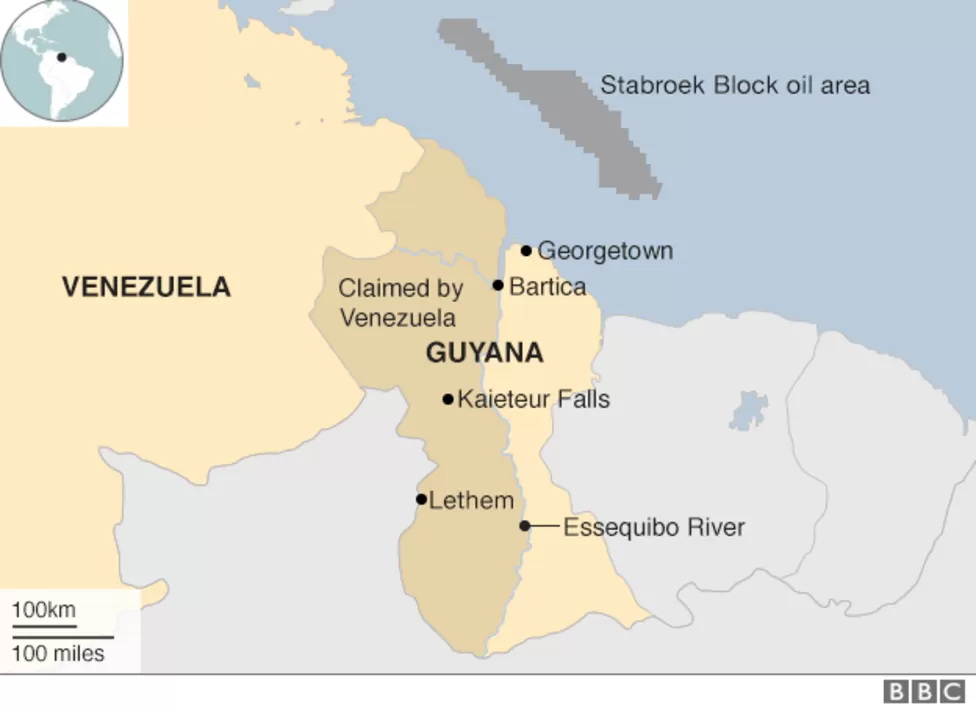The ICJ Establishes Its Jurisdiction Over The Guyana-Venezuela Border Dispute
A map of the disputed area of Guyana Esequiba and the Stabroek oil reservoir. Source: BBC
On Thursday, the International Court of Justice (ICJ) released an Arbitral Award announcing it had ruled 14:1 on whether it had the jurisdiction to arbitrate a border dispute between Guyana and Venezuela, and that it rejects the Venezuelan challenge to the case’s admissibility.
The case was opened by Guyana in 2018 to end a centuries-long dispute over the Esequiba region in West Guyana, which led to Venezuela’s challenge. Now that the ICJ has announced its legal ability to adjudicate, they will, sometime in the future, decide on a final verdict.
Guyana’s president, Irfaan Ali, welcomed the decision soon after and declared that “Guyana remains confident that its longstanding international boundary with Venezuela will be confirmed by the court.” Venezuelan Vice President Delcy Rodriguez, on the other hand, claimed that the country would "adopt all the measures available for the defense of its legitimate rights and territorial integrity," and that it would prefer negotiations outside of the ICJ.
Tensions between Guyana—at the time a British colony—and Venezuela ended with the 1899 arbitration by an international tribunal, which finalized the current borders and was agreed upon by all parties. However, in 1962, Venezuela announced that the earlier arbitration was “null and void” and claimed around two-thirds of Guyana’s territory on the grounds that, according to the foreign minister at the time, the “court of arbitration [had no] Venezuelan judges and lawyers.” Guyana’s UN Ambassador, Noel Sinclair, responded that Venezuela had deliberately chosen to be represented by the United States in that dispute.
A public hearing on the question of the jurisdiction for the Arbitral Award of 3 Oct. 1899 (Guyana v. Venezuela). Source: UN Photo/ICJ-CIJ/Frank van Beek
The enmity lessened somewhat after the 1966 Geneva Agreement, which was essentially an "agreement to reach an agreement." It created a mixed commission of representatives from Venezuela and Guyana but failed to reach a consensus.
The dispute continued until 2015, when the discovery of oil by ExxonMobil in the disputed region revived tensions. The offshore oil reservoir in the Atlantic, known as the Stabroek block, is controlled by a consortium of the US ExxonMobil Corp and Hess Corp companies, as well as the Chinese CNOOC Ltd.
The reservoir is partly located in waters that are claimed by Venezuela, adding a volatile element to the conflict that increased the aggression of Venezuelan President Nicolás Maduro. As antagonism rose, Guyana requested in 2018 that the ICJ open a case to confirm the border based on 1899 arbitration.
Venezuela boycotted the case, claiming that the ICJ did not have jurisdiction, and then claimed that Great Britain had to be involved, as they were in 1899. They also claimed that the 1966 Geneva Agreement nullified the 1899 arbitration.
The recent ruling by the ICJ dismisses Venezuela’s complaints, and ensures the court’s authority over the dispute. It is potentially an important step towards an eventual resolution to decades of disputing.
However, the ruling only confirms the ICJ’s jurisdiction, and is not an actual decision on the case. The next course of action will be deliberations for a final verdict—something that could potentially take years.


